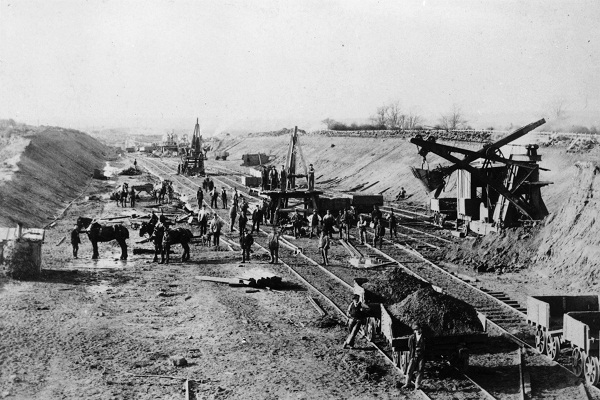Train Dreams, the Pulitzer nominated novella by playwright, poet and U.S National Book Award winning novelist Denis Johnson, is the life story of Robert Grainer, a man who ‘had one lover… one acre of property, two horses, and a wagon… [had] never been drunk… never purchased a firearm or spoken into a telephone.’ Born at the end of the nineteenth century and dead a year before the Summer of Love, Robert labours in the American West, cutting timber for railroad tracks and then, when he’s too old for that work, carting people’s possessions around the countryside. The book’s chronology is loose, or, rather, Grainer’s whole life comes at us at once.
Right at the beginning of the novel, and somewhere near the beginning of Grainer’s life, he collaborates in an attempt to kill a Chinese man accused of stealing from a construction site. Upon escaping, the supposed thief curses his assailants, and Grainer spends the rest of his life convinced that his personal tragedies are the result of the curse.
Train Dreams is about an ‘old way of American life’ and an old-world superstitious temper – the willingness of people to believe ‘just about anything funny or witchy or religious they hear about.’ It isn’t just the curse on Grainer, but the idea of curses themselves which hangs over the world of the book. In the psychology of the age, curses are substantial, like in Shakespeare or Verdi’s Rigoletto, and we are made to feel this. Grainer witnesses people dropping dead around him, ghostly apparitions and Native American myths made true. But all of this is subtly done, almost off-hand, even, so that these moments don’t announce themselves over the other events (or non-events) of Grainer’s life. Everything is played on the one quiet level.
Johnson deserves praise for his lightness of touch, which packs stark sentences full of religious nuance. Here is Grainer doubting God, having just discovered his home destroyed by a forest fire and his family missing. ‘He saw no sign of their Bible, either. If the Lord had failed to protect even the book of his own Word, this proved to Grainer that here had come a fire stronger than God.’ (Note the un-capitalised possessive, which very gently suggests Grainer’s receding belief: ‘his own Word.’)
Elsewhere, Johnson’s prose bursts into a style as intense as William Faulkner’s: ‘clusters of orange butterflies exploded off the blackish purple piles of bear sign and winked and fluttered magically like leaves without trees.’ Burning spruces ‘[trail] smoke like pyrotechnical snakes, their flaming tops hissing as they hit the river.’ It’s one of those books which is its own plateau; Johnson, we feel, couldn’t have made it any better. Every observation or act of mimicry seems pitch-perfect, not a word appears out of place, and the stylistically dense moments don’t intrude on the book’s smoothness of tone.
But the real achievement of Train Dreams is the pretended simplicity of its form. The blurb doesn’t lie about it being an ‘epic in miniature.’ It is as if a sprawling, eighteenth century adventure has been condensed to just over a hundred pages. Characters put in compact, monologuing stints and then disappear entirely, like the waifs and strays Tom Jones encounters on his journey to London. You’ve even got some (unbelievably) sophisticated use of malapropism and misunderstanding.
A travelling show comes to a nearby town promising on-stage births and blood transfusions, along with more conventionally illicit entertainment. Grainer becomes obsessed by a woman billed as ‘Winner of the Famous Pageant of Pulchritude,’ though in the end he doesn’t go to see her. But it is the word ‘pulchritude,’ or rather the dark meanings he imposes upon that word (which, in the case of the sign, is already a misuse – a misjudged synonym for the sake of alliteration), which captivates him. The book is full of minute comedic pieces like this.
Train Dreams isn’t just about how the world used to be, but a clever look at how storytelling used to be. It simultaneously defends a spare, organic form of realism which may soon go out of fashion – there’s only so long Hemingway’s influence can hold out before it’s ousted by some new digitally-minded mongrel – while looking even further back to the beginnings of the novel. It is a work of concentrated magic and concentrated prose worth far more than the time it would take to read.
Train Dreams by Denis Johnson is published by Granta Books (£12:99)






Comments